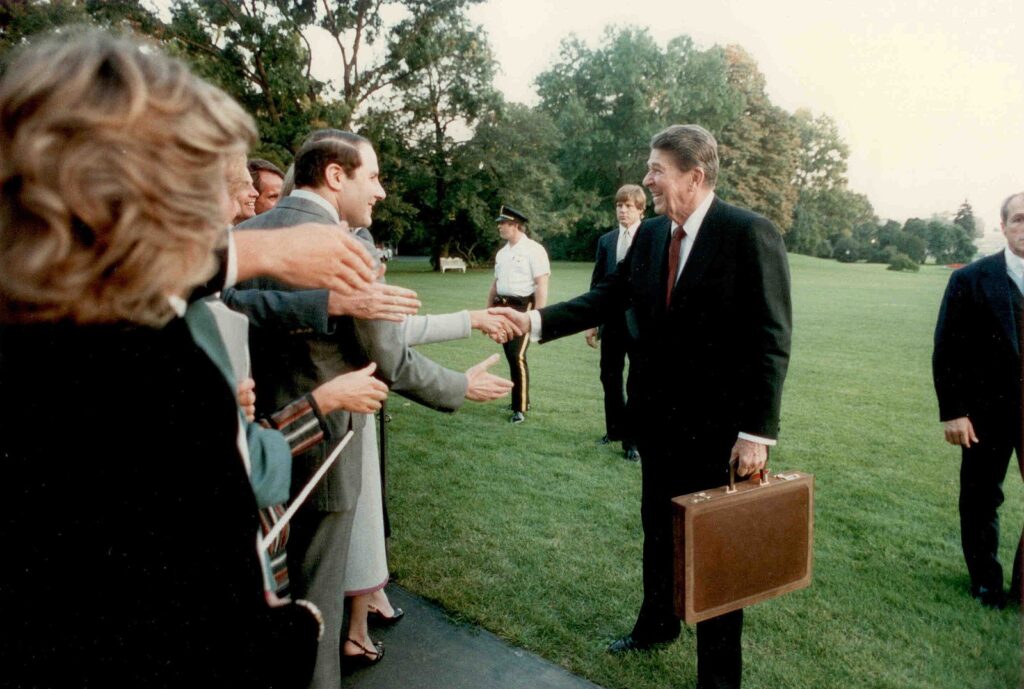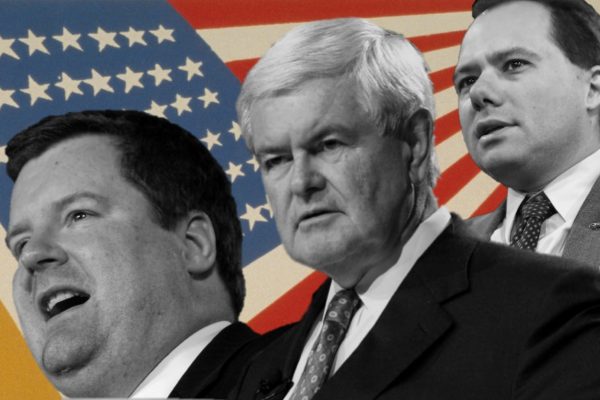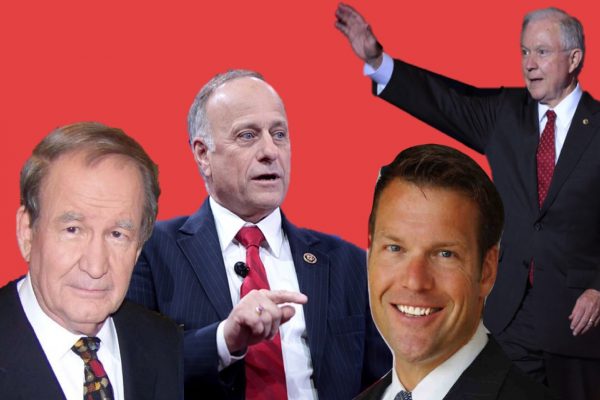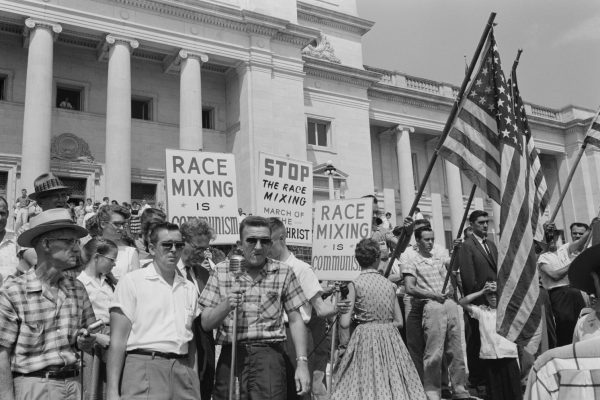Reaganland: America’s Right Turn 1976–1980
Rick Perlstein
Simon and Schuster, $40 (cloth)
From a humanitarian perspective, the Trump administration’s handling of the COVID-19 pandemic has been a disaster. But in the eyes of U.S. corporate leaders in a handful of the country’s wealthiest companies, Trump’s COVID-19 policy has been quite successful. The stock market has mostly recovered since the crash in March, and Jeff Bezos has made more than $70 billion.
In Washington it has long seemed that the well-being of corporations takes priority over the well-being of citizens—but there has never been such obvious proof. During a recent round of debates on further stimulus provisions, Republican Senate majority leader Mitch McConnell made it clear that his primary concern is not relief packages for devastated communities, but a “liability shield”—that is, a provision that insulates corporations from COVID-related lawsuits.
When Donald Trump won the presidential election in 2016, he and his pundits declared it a victory for the white working class. But the main beneficiaries of the past four years have been business executives and billionaires. Trump’s presidency, whether it spans four years or longer, will be remembered for its open war on democracy, its overt racism and xenophobia, and the frequency with which the president voiced open disregard for human life (as when he recently said that the pandemic-related deaths in blue states “don’t count”).
But in the end, Trump’s most enduring deformation of U.S. political life may derive from his slavish devotion to unchecked corporate power and his work in further consolidating power in the hands of a few billionaires. As Christian Lorentzen recently wrote in Bookforum, the Republican Party under Trump should primarily be understood as “an electoral entity that reliably obtains tax cuts for the wealthy, deregulation for big business, increased budgets for the military, and little of anything else for anyone else.”
How did the United States end up here? How did a country that prides itself on the opposing concentration of power—on extensive checks and balances—end up generating a corporate autocracy so complete that it is nearly impossible to imagine its end? Any attempt to understand and dismantle this current regime must begin with an appreciation of how it evolved in the first place. On this front, historian Rick Perlstein’s new book, Reaganland: America’s Right Turn 1976–1980 (2020), provides invaluable context, alongside a timely reminder that this political development is still quite new.
Though Reagan’s ascent to power bears countless parallels to our time, it also explains how corporate power came to be enshrined in Washington.
Reaganland depicts the rise of Ronald Reagan in the late 1970s. It is the final volume of Perlstein’s four-book series on the modern history of U.S. conservatism (beginning with Before the Storm in 2001), which follows the movement from Barry Goldwater’s rise in the early 1960s through Reagan’s election in 1980. The period of Reagan’s ascent bears countless parallels to our time: a politics that coalesces around a B-list celebrity, the deployment of racist dog whistles, the mobilization and consolidation of the Christian right, and the rise of radical conservatism. But most striking is the book’s depiction of how corporate power came to be enshrined in Washington. Perlstein’s is not the first book to deal with the convergence of corporate interests and Republican Party orthodoxy; other notables include Kim Phillips-Fein’s Invisible Hands (2009) and Jane Mayer’s more recent Dark Money (2016). Yet Reaganland significantly contributes to our understanding of U.S. plutocracy by focusing on the moment in the late 1970s when corporate lobbyists became an overwhelming political force.
Today we take for granted that corporations practically run Washington, meaning that any ambitious legislation must pass through countless corporate lobbyists before Senators dare vote. But in the mid-1970s, as Reagan was emerging as a national star of conservatism, corporate power in Washington was weak and disorganized. This would all change in just a few years.
The rise of corporate power in U.S. politics owes neither to some intrinsic flaw in the United States nor to the unstoppable forces of the global economy. Reaganland, echoing Perlstein’s previous books, instead explains that tireless political activism and organization determined the triumph of radical conservative ideas in economic policy. The conservative movement’s new institutions owed to the Republican Party’s increased responsiveness to organized corporate lobbying, and a new breed of activist business executives armed with the tomes of Ayn Rand and Friedrich Hayek. Describing these executives, whom Perlstein dubs “boardroom Jacobins” (in an ironic reference to the French anti-royalist revolutionaries), he writes:
According to the theories of Karl Marx, revolutions happen when a group of people in a similar position in the economic structure become a ‘class for itself’: when they become conscious of their collective grievances, stop fighting one another, and organize to fight their common oppressor instead. That was what was happening in America [in the mid-1970s]. Only the class in question wasn’t the proletariat. It was the corporate executives.
And this was a great reversal from the previous decade. During the 1960s, with the rise of consumer advocacy groups and activists such as Ralph Nader, a newly energized left had successfully challenged corporate disregard for issues such as pollution and car safety. Following 1968 the portion of Americans who said “business tries to strike a fair balance between profits and the interest of the public” fell from 70 percent to 18 percent by 1973. By the early 1970s, corporate leaders expressed a feeling of exclusion from political power in the United States. “We don’t have a business community, just a fragmented bunch of self-interested people,” one business executive complained in 1975.
This sense that an emerging left had victimized big business led corporate interests to consolidate, as they found a common enemy to mobilize against. This fight against the left energized a new breed of corporate activists and lobbyists, who began to meet informally around Washington’s K Street and in hotels in downtown D.C. (the Carlton Group, a famous network of lobbyists, literally met in the lobby of the Ritz-Carlton hotel). Perlstein depicts colorful, largely unknown pioneers of the early years of corporate lobbying, such as Charls Walker. Walker, who Perlstein describes as “a sort of Vladimir Lenin of the new class-for-itself style of corporate lobbying,” would shape the 1978 corporate tax reform often seen as a precursor to Reaganomics.
Walker founded the American Council for Capital Formation and lobbied to make the “three martini lunch” tax deductible. An early Reagan supporter, he also shaped the Reagan campaign’s economic agenda by convincing him that he could simultaneously promise massive tax cuts and huge increases in military spending. Walker lobbied Congress to support the 1978 tax reform by selling it as beneficial for the middle class, despite the fact that 80 percent of the benefits went to just 10 percent of the biggest corporations. This has since become the model for Washington’s tax reform debates.
Conservative business activists convinced the American public that taxes were the most pressing economic issues of the 1970s.
Activists like Walker, and the organizations they formed (such as Business Roundtable and National Federation of Independent Business), executed one of the most remarkable political shifts in modern history. In just a few years, they convinced the American public that tax rates for corporations and capital gains—which were then paid by only a sliver of the wealthiest Americans—were the most pressing issues of the era. Indeed, this was “the fruit of a successful propaganda campaign from the nation’s boardroom Jacobins,” Perlstein writes.
And Reagan did not only ride this wave of corporate activism into the White House, he was also one of its most successful activists. Reagan was uniquely skilled at transforming the rhetoric of corporate lobbyists and economists into a language that resonated with the middle-class, selling the hooey of trickle-down economics as beneficial to the general public. This was perhaps his greatest contribution to the emerging networks of boardroom Jacobins of the late 1970s. Reagan triumphantly declared that massive tax cuts would “pump through the economy, generating growth, new jobs, and thus new sources of revenue for the government,” while dismissing those who questioned how tax cuts could generate more revenue as “old-fashioned economists” stuck in “static analysis.” The so-called “Great Communicator” was able to impart conservative economists’ messages with a folksy populism, describing consumer advocates such as Nader—and any Democrats who dared call for increased regulation—as elitist bureaucrats who believed Americans were “too dumb to buy a box of corn flakes without being cheated.”
Reagan’s rise as a national conservative star occurred in tandem with the strengthening of the corporate lobbying infrastructure. K Street, Perlstein writes, “was finally getting its act together.” And U.S. politics would never be the same: “After a decade of pummeling by liberals, the denizens of America’s better boardrooms, who had once comported themselves with such ideological gentility, began behaving like the legendary Jacobins of the French Revolution. They declared war without compromise.”
The political success of Reaganism transformed both the Republican Party and their Democratic counterpart. Writer Anand Giridharadas recently said that in the decades following Reagan’s election, the left absorbed the right’s hatred of government and its devotion to corporate power “almost like a secondhand smoke.”
Corporate executives and billionaires wield enormous cultural power, shaping public opinion with their massive reach in the news media.
To be sure, corporate executives and billionaires do not wield more votes than citizens. In fact, they represent only a tiny fraction of the voting population. But their cultural power is enormous; they are the ultimate “influencers,” shaping public opinion with their massive reach in the news media. When Bernie Sanders led the polls in the Democratic primary earlier this year, the heads of financial institutions and large corporations provided the media with an endless succession of panicked statements. Lloyd Blankfein—former CEO of Goldman Sachs, longtime Democratic Party donor, and old friend of the Clintons—told the Financial Times that he would probably vote for Trump in November if Sanders were the Democratic nominee. When COVID-19 deaths rose globally this spring, Leon Cooperman, chairman and CEO of Omega Advisors who boasts a net worth of $3.2 billion, told CNBC, “I look at Bernie Sanders as a bigger threat than the coronavirus.”
Even with the economic centrist Joe Biden as the Democratic nominee, the slightest departure from neoliberal economic orthodoxy leads to an immediate slap on the wrist, with billionaires and executives swarming TV to complain that increasing the capital gains tax from 20 to 22 percent will be the end of the United States as we know it. Cable news hosts never seem to tire of providing Kleenex for the crocodile tears of billionaires. And it is not just CNBC and Fox Business Channel, but the Sunday morning political shows—including Fareed Zakaria GPS (CNN), Meet the Press (NBC), and Fox News Sunday with Chris Wallace—that regularly invite billionaires on air for no reason other than their wealth.
And perhaps this is the deepest legacy of Reaganism. The pollster David Shor recently explained to New York magazine that the power of billionaire activists, or the boardroom Jacobins, is not just the power of their fat pocketbooks; rather, they possess cultural power:
Why do so many moderate Democrats vote for center-right policies that don’t even poll well? . . . [T]he thing is, while that median voter doesn’t want to deregulate banks, that voter doesn’t want a senator who is bad for business. . . . I think that’s a very straightforward, almost Marxist view of power: Rich people have disproportionate cultural influence. So business does pull the party right. But it does so more through the mechanism of using its cultural power to influence public opinion, not through donations to campaigns.
Rick Perlstein’s Reaganland reminds us that the victories of Reaganism were not just political, but cultural. Reaganism entrenched the belief among middle-class Americans that any opposition to capital gains tax cuts and corporate deregulation was inherently unpatriotic. But Perlstein’s book also reminds us that this state of affairs is not natural law; it was established by a small cohort of radical, political activists. This also means that it will not last forever.









